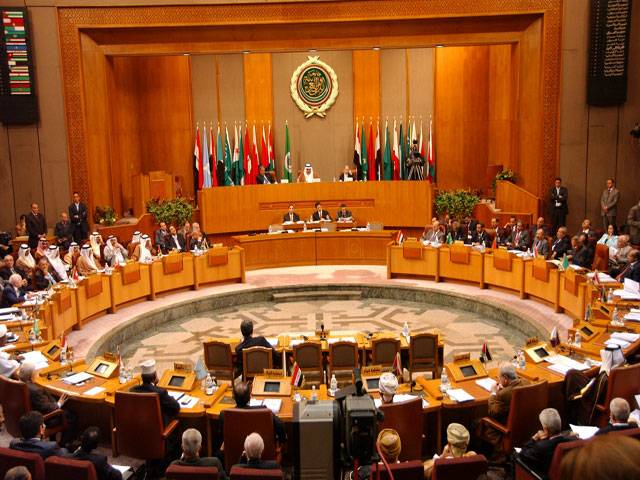CAIRO : Arab states formally endorsed proposed peace talks to end the Syrian civil war that have been delayed by disputes between world powers and divisions among the opposition.
A final communiqué after an emergency meeting of Arab League foreign ministers on Sunday called on the opposition swiftly to form a delegation under the leadership of the mainstream Syrian National Coalition, to attend the “Geneva 2” talks.
The Arab League’s position indicated Gulf rivals Qatar and Saudi Arabia - who have backed different rebel groups fighting President Bashar al-Assad - had put their differences aside to urge opposition chief Ahmad Jarba to head to Geneva. But even with regional diplomatic weight thrown behind the talks, it is unclear when they will go ahead and what they can achieve.
The mainly exiled political opposition has limited clout over rebel fighters on the ground, who include al Qaeda-linked brigades.
The Geneva talks are meant to bring Syria’s warring sides to the negotiating table, but many disputes still remain including the issue of whether Iran, Assad’s biggest regional supporter, should attend.
Jarba, who is backed by Iran’s foe Saudi Arabia, told Arab foreign ministers the opposition coalition would not attend if Iran was there. He also said there had to be a clear time frame for Assad to leave power, and called for more weapons to be delivered to rebels fighting Assad.
The growing influence of radical Islamist fighters and divisions among rebel forces have made Western powers reluctant to intervene directly in a conflict that has killed more than 100,000 people and driven millions from their homes.
World powers are divided over Iran’s participation in the talks. Tehran, which backs Assad’s regime, has said it is ready to come and international envoy Lakhdar Brahimi says the United Nations would prefer Iran to attend.
Syria’s Foreign Ministry reiterated on Sunday that it must be up to Syrians alone “to choose their leadership and political future without political interference”.
Accusing Kerry of trying to derail the talks, it said in a statement he “must realize that the success of the Geneva conference depends on the will of the Syria people themselves”.
The Arab League, however, said only pressure from major powers could ensure a successful outcome in Geneva.
In its communiqué it “reaffirmed the Arab position that demands the necessity of the required international guarantees to supervise and ensure the success of a peaceful solution at the Geneva 2 conference”.
Opposition member Burhan Ghalioun told Reuters on Monday the communiqué showed “the Arab League’s support for the Syrian opposition and the Syrian people in confronting ... Assad’s regime and for Geneva 2 to be able to put forth a political solution that ends with the demise of the current regime and the emergence of the next one”.
Brahimi has said he hoped the conference could still be held in the next few weeks despite the obstacles and said there should be no preconditions to attend the meeting.
But rebels say they will consider any process which does not lead to the end of Assad’s rule - and accountability for him and his supporters - as a betrayal of their campaign.
A statement signed by several powerful Islamist militias a week ago said that attending Geneva talks on any other basis would amount to “treason that requires trial by our courts”.
Rebel strength has been eroding on the battlefield, with Assad’s forces making slow but gradual gains as they consolidate control near Damascus and the central city of Homs.
Last week they also recaptured the town of Safira, southeast of the city of Aleppo, a further rebel setback which prompted the resignation of local rebel leader Abdeljabbar al-Oqaidi from the Western-backed Supreme Military Council.
In a resignation video issued on Sunday, Oqaidi blamed rifts among rebels for losing Safira, and bitterly congratulated the opposition in exile “for your hotels and your political posts”.
State television said on Monday Assad’s forces had taken a village on the northern edge of Safira and were attacking the rebel-held town of Tel Arn about 2 miles further north. Live TV footage showed columns of smoke rising from Tel Arn.
Friday, April 19, 2024
AL backs Syria peace talks, urges opposition to go

8:27 AM | April 19, 2024
8:09 AM | April 19, 2024
Opposition objects to oath-taking of MNAs amid lawlessness
5:15 PM | April 19, 2024
Electioneering to end on Friday night ahead of by-polls in 21 constituencies
5:14 PM | April 19, 2024
Fawad Chaudhry granted bail in 14 cases related to May 9 violence
5:13 PM | April 19, 2024
British Army chief lauds Pakistan Army's professionalism, expertise
5:12 PM | April 19, 2024
Israeli aircraft fire missiles at Air Force assets in Iran: Report
3:52 PM | April 19, 2024
A Tense Neighbourhood
April 19, 2024
Dubai Underwater
April 19, 2024
X Debate Continues
April 19, 2024
Hepatitis Challenge
April 18, 2024
IMF Predictions
April 18, 2024
Kite tragedy
April 19, 2024
Discipline dilemma
April 19, 2024
Urgent plea
April 19, 2024
Justice denied
April 18, 2024
AI dilemmas unveiled
April 18, 2024
ePaper - Nawaiwaqt
Advertisement
Nawaiwaqt Group | Copyright © 2024





